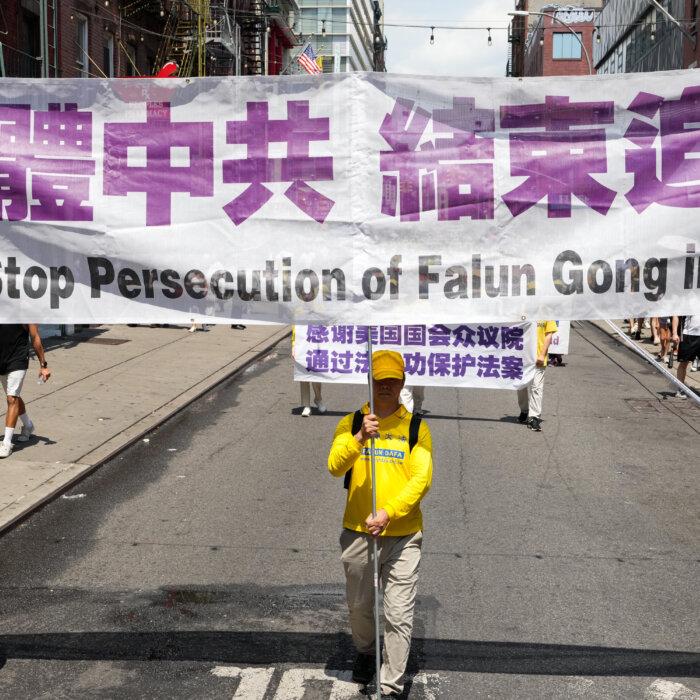Falun Gong practitioner Qin Yongjie expressed his heartfelt gratitude to the United States for “the freedom to practice his beliefs on its soil” while attending a recent parade in the U.S. capital.
On July 17, Falun Gong practitioners and supporters from the eastern United States gathered in Washington to commemorate the 26th anniversary of the ongoing persecution of Falun Gong by the Chinese regime, calling for the disbandment of the Chinese Communist Party (CCP) and an end to the persecution.
“In China, the persecution our family endured is one example of the CCP’s persecution of Falun Gong,” Qin said.
“For 26 years, the unimaginable suffering endured by Falun Gong practitioners in mainland China has been beyond the comprehension of the international community.”
“I hope the Falun Gong Protection Act will be passed in Congress as soon as possible for the president to sign into law, helping to end the persecution soon.”
He said that “in Communist China, there is no freedom of belief.”
“The CCP forces all Chinese people to study Marxist-Leninist doctrines of struggle from a young age, which is a very terrifying reality,” he said.
The sanctions would apply to foreign nationals “who the President determines have knowingly engaged in or facilitated the involuntary harvesting of organs within the People’s Republic of China,” according to the bill.
Newfound Freedom
This was Qin’s second time attending the commemoration event in the United States. He felt a “sacredness and excitement” during the parade, noting it is “impossible to practice in mainland China right now.”Qin and his wife, Chen Ruiyun, both schoolteachers in China, fled the communist country in February last year.
“We trekked through mountains and rivers, crossing from Central to South America, and arrived in the United States after countless hardships, finally reuniting with our daughter,” he said.
They had planned this journey after a particularly harrowing experience in May 2014, when the couple and their daughter were detained in a detention center in their hometown of Weifang city, Shandong Province, for a month.
“From that moment, we began seeking ways to flee overseas,“ Qin said. ”My daughter came to the United States to study in January 2018, and my wife and I finally achieved our dream of joining her last year.”
Qin’s story with Falun Gong dates back to 1997, when he began practicing it with his wife, who had taken up the practice a year earlier, during its meteoric rise in popularity since its introduction in 1992.
“The principles of Falun Gong—truthfulness, compassion, and forbearance—gave us boundless hope and strength for the future. From then on, Falun Dafa became our lifelong faith,” he said.
‘Cuffed to Iron Door for 79 Days’
Since the start of the persecution, many practitioners, including Qin and his wife, were forcibly taken away by the authorities and sent to China’s extrajudicial system of forced labor camps and prisons.“Being detained in detention centers, jails, and brainwashing centers became a frequent occurrence for our family,” Qin said. “My wife and I were abducted and detained over 10 times by the CCP; our daughter was abducted and detained twice.
“I was taken to a forced labor camp twice for a total of four years, while my wife was sent to a labor camp for three years.”
Qin spent two months in the Weifang Forced Labor Camp before being transferred to the Wangcun Forced Labor Camp, where the majority of arrested male Falun Gong practitioners from Shandong Province were detained and persecuted.
He said he was handcuffed day and night—even while eating, sleeping, using the bathroom, and changing clothes—for 141 days.
Qin recalled the persecution he experienced at the labor camp.
“I was confined in a roughly four-square-meter cell in solitary confinement. They forced me to be cuffed to the iron door, stand, and embrace the door for 79 days,” he said.
“During the first 10 days, I was not allowed to close my eyes; if I did, I was beaten on the head with a small stick.”
Qin’s legs swelled severely due to prolonged standing and his struggle to maintain balance. On the 10th day, Qin protested their depriving him of sleep, which led to more abuses.
Qin said more than 10 policemen, each wielding an electric baton, electrocuted him.
“This inhumane electric torture lasted an entire morning and covered my entire body,” he said.
“The scars from the electric shocks took two years to fade.”
After the torture session, Qin could only lean against the iron door while standing cuffed to it. The guards then allowed him to lie down from midnight to 5 a.m., but kept him chained to the door for the rest of the day. This torture continued for 79 days.
In protest of the abuses, Qin went on a hunger strike for 74 days, during which the police resorted to force-feeding, thrusting a tube through his nostril into his stomach. He said that each time the tube was inserted or removed, his nose bled, causing excruciating pain.
Despite the abuses, Qin remained unwavering in his faith. He said that the main principles of Falun Gong—to be true, compassionate, and forbearing—constitute “the core of what people often refer to as universal values.”
The Brainwashing Center
The abuses occurred not only in forced labor camps but also in so-called brainwashing centers. On one occasion, in a brainwashing center in Weifang city, Qin and his wife, Chen, were held in separate small rooms with all doors and windows fitted with iron bars and tightly sealed.The police used another torture method on them: handcuffs and foot shackles welded to iron chairs.
Qin and Chen were forced into these iron chairs and were handcuffed and shackled at the ankles. The police worked in three shifts to interrogate them separately around the clock, attempting to coerce them into renouncing their faith.
Whenever they closed their eyes, the police either splashed cold water on their faces or blasted loud noises through speakers placed near their ears.
This round-the-clock sleep deprivation lasted nearly 40 days until the police extorted fines of 20,000 yuan ($2,796) and 10,000 yuan ($1,398) from the schools where Qin and Chen worked before releasing them. The money was deducted from their salaries.
For more than 20 years, the CCP’s surveillance of them never ceased.
“We lived in fear, constantly worried about being arrested, beaten, imprisoned, or even killed,” Qin said.
Ongoing Persecution in Weifang City
Reports on Minghui, a website dedicated to documenting the persecution of Falun Gong by the regime, revealed that at least 139 Falun Gong practitioners in Qin’s hometown of Weifang city had been persecuted to death by the CCP.Many more cases go unreported due to families’ fear of repercussions at the hands of the regime.
Among the Falun Gong practitioners persecuted to death for their faith, Qin said he personally knew 18 of them.
Some of them were killed during detention, while others died shortly after being released from prisons, labor camps, or brainwashing centers.
Because Jiang refused to renounce his faith in Falun Gong, he was arrested 13 times, sentenced to forced labor three times, and later imprisoned for five years in Shandong Men’s Prison, where he was subjected to drug torture.
After his release, Jiang continued to suffer from the effects of the unknown drugs that were forcibly injected into him in prison, experiencing abdominal swelling, weakness, dizziness, nausea, vomiting, and rectal bleeding, according to Minghui. He frequently fainted and ultimately passed away on April 29, 2021.
Qin, who frequently visits Minghui to keep abreast of the ongoing persecution of Falun Gong practitioners in his hometown, said, “The persecution in Weifang City remains severe.”
From Minghui, he learned that his friend Wu Jiqiang, a Falun Gong practitioner in Weifang, was sentenced to four and a half years in prison by the Kuiwen District Court on April 18. Many of his other friends remain detained by the CCP in detention centers and prisons.
“I thank the U.S. government and the American people for their support of Falun Dafa, which helps bring justice to persecuted Falun Gong practitioners in China,” Qin said.








